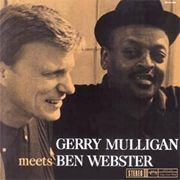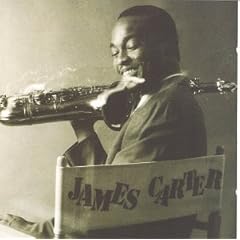
Gerry, for weeks I’ve been obsessed with your Gerry Mulligan Meets…series. I wrote about your collaboration with Thelonious Monk and Ben Webster. Now I’m listening to what I believe is the best of the lot Gerry Mulligan Meets Johnny Hodges. I felt as if I attended the recording session. I know that sounds silly. I wasn’t even born when you and Hodges produced this masterpiece. Actually, the albums feels like you made it in you house, and Hodges dropped by unannounced. When two great jazz musicians meet some magnificent music is bond to ensue.
You jokingly told Hodges you would only let him inside if he had his alto. Before leaving his house, Hodge grabbed his alto first, then his wallet and his car keys. You guys drank, and gossiped. Then you scooped up your baritone. You wanted Hodges is critique a new tune you had written titled “Bunny." You wrote the composition in his honor, but you didn't tell him that beforehand. You wanted to gauge his reaction first-if he cringed after hearing the melody. Or if he grabbed his horn to join in.
Hodges liked "Bunny" right away. You were only two choruses into “Bunny” and miles away from the bridge before Hodge joined you, offering counter-melodies like he had co-written the tune. Hodge was the competitive sort. You understood the altoist had to be tough grewing up in Ellington's family.
So, after you guys finishing "Bunny," Hodge didn't allow your horns to cool down. Hodges called the ballad “What’s The Rush”. Ballads were his hallmark. He played them with such dignity and warmth.
You didn't challenge him. When it was your turn to solo, it sounded as if you just shut your eyes and did the best you could. Gerry, I must say it was smitten by how you caressed every note. I bet you even made Hodge blush, and maybe a little envious.
You were more assertive on “Back Beat" and “Shady Side,” refusing to be outdone by Hodges in your dwellings. On “Shady Side,” you took the melody by the hand, and strolled through the changes.
Gerry Mulligan Meets Johnny Hodges wasn’t conceived as I described. Journalist Nate Hentoff, who wrote the liner notes, didn’t say how this album was conceived. To me, the album felt like all you wanted to do was blow with a close buddy.
You jokingly told Hodges you would only let him inside if he had his alto. Before leaving his house, Hodge grabbed his alto first, then his wallet and his car keys. You guys drank, and gossiped. Then you scooped up your baritone. You wanted Hodges is critique a new tune you had written titled “Bunny." You wrote the composition in his honor, but you didn't tell him that beforehand. You wanted to gauge his reaction first-if he cringed after hearing the melody. Or if he grabbed his horn to join in.
Hodges liked "Bunny" right away. You were only two choruses into “Bunny” and miles away from the bridge before Hodge joined you, offering counter-melodies like he had co-written the tune. Hodge was the competitive sort. You understood the altoist had to be tough grewing up in Ellington's family.
So, after you guys finishing "Bunny," Hodge didn't allow your horns to cool down. Hodges called the ballad “What’s The Rush”. Ballads were his hallmark. He played them with such dignity and warmth.
You didn't challenge him. When it was your turn to solo, it sounded as if you just shut your eyes and did the best you could. Gerry, I must say it was smitten by how you caressed every note. I bet you even made Hodge blush, and maybe a little envious.
You were more assertive on “Back Beat" and “Shady Side,” refusing to be outdone by Hodges in your dwellings. On “Shady Side,” you took the melody by the hand, and strolled through the changes.
Gerry Mulligan Meets Johnny Hodges wasn’t conceived as I described. Journalist Nate Hentoff, who wrote the liner notes, didn’t say how this album was conceived. To me, the album felt like all you wanted to do was blow with a close buddy.



